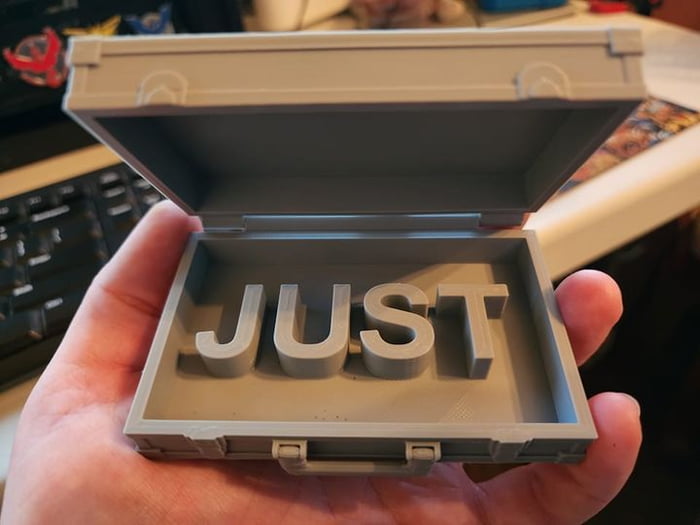Life is unpredictable, and sometimes things don’t go as planned. That’s why understanding the concept of "just in case" can save you from a world of trouble. Whether it’s preparing for emergencies, making smart decisions, or simply having a backup plan, being ready for the unexpected is essential in today’s fast-paced world. So, buckle up and let’s dive into why "just in case" should be your new motto.
Imagine this: You’re on your way to an important meeting, and suddenly your car breaks down. Or maybe you’re hiking in the wilderness, and your phone battery dies. These scenarios might sound like bad dreams, but they happen more often than you think. That’s where the "just in case" mindset comes in. It’s about being proactive and staying one step ahead of life’s curveballs.
This article isn’t just another boring guide. We’re here to break it down in a way that’s relatable, practical, and—most importantly—useful. Whether you’re a seasoned planner or someone who lives life on the edge, there’s something here for everyone. Let’s get started!
Read also:Xxx Leak Video
What Does "Just in Case" Really Mean?
At its core, "just in case" is all about preparation. It’s that little voice in your head that says, "Hey, maybe you should pack an extra umbrella today." It’s not about being paranoid; it’s about being smart. Preparing for the worst while hoping for the best is a skill that everyone should master.
Let’s face it, life has a way of throwing surprises at us when we least expect it. From power outages to last-minute travel changes, having a "just in case" plan can make all the difference. It’s like having a safety net that catches you when things go south.
Why Is "Just in Case" Important?
Here’s the deal: Being prepared doesn’t mean you’re expecting the worst. It simply means you’re ready for whatever comes your way. Think about it—wouldn’t you rather have a spare tire in your car and not need it than need it and not have it? Exactly.
- It reduces stress and anxiety
- It gives you peace of mind
- It helps you respond quickly to unexpected situations
And let’s not forget the financial benefits. Preparing for the unexpected can save you money in the long run. For example, having an emergency fund can prevent you from going into debt if something unexpected happens.
How to Develop a "Just in Case" Mindset
So, how do you cultivate this mindset? It starts with small habits and a willingness to think ahead. Here are a few tips to get you started:
Start Small
You don’t have to overhaul your entire life overnight. Begin by focusing on one area where you could improve your preparation. For instance, if you’re always running late, start setting your alarm 15 minutes earlier. If you’re worried about forgetting important documents, create a checklist.
Read also:Hanime
Plan for the Most Likely Scenarios
Not every situation requires a full-blown emergency kit. Focus on the things that are most likely to happen in your life. For example, if you live in an area prone to storms, having a basic emergency kit with water, food, and flashlights is a no-brainer.
Practical Applications of "Just in Case"
Now that we’ve covered the theory, let’s talk about real-life applications. Here are some ways you can incorporate "just in case" into your daily routine:
Travel Preparation
Traveling can be unpredictable, but with a little preparation, you can avoid common pitfalls. Pack a small first-aid kit, carry a portable charger, and always have a printed copy of your itinerary. These small steps can make a big difference when things don’t go as planned.
Emergency Preparedness
Living in a world where natural disasters and emergencies can strike at any moment, it’s crucial to have a plan. Create an emergency contact list, store important documents in a safe place, and ensure your family knows what to do in case of an emergency.
Common Mistakes to Avoid
While "just in case" is a great mindset to have, it’s easy to go overboard. Here are a few common mistakes to avoid:
- Over-preparing to the point of paranoia
- Spending too much money on unnecessary items
- Forgetting to update your plans regularly
Remember, preparation is about balance. You want to be ready, but you don’t want to let fear take over your life.
Tools and Resources to Help You Stay Prepared
Fortunately, there are plenty of tools and resources available to help you stay prepared. From apps that track weather patterns to websites that offer financial advice, the internet is full of useful information. Here are a few recommendations:
- Weather apps like Weather.com
- Financial planning tools like Mint
- Emergency preparedness guides from FEMA
These resources can provide you with the information you need to make smart decisions and stay safe.
Real-Life Examples of "Just in Case" in Action
Let’s look at some real-life examples of how "just in case" has made a difference:
Example 1: The Backpacker’s Story
A young backpacker traveling through Europe had a small first-aid kit in her bag. When she accidentally cut herself while cooking, she was able to treat the wound herself, avoiding a trip to the hospital. Her "just in case" preparation saved her time and money.
Example 2: The Family’s Emergency Plan
A family living in a flood-prone area had a detailed emergency plan in place. When a storm hit unexpectedly, they were able to evacuate quickly and safely, thanks to their preparation. Their "just in case" mindset made all the difference.
How to Involve Your Family in "Just in Case" Planning
Preparation isn’t just a solo activity. Involving your family in "just in case" planning can make everyone feel more secure. Here are a few ideas:
- Hold regular family meetings to discuss emergency plans
- Create a shared emergency contact list
- Practice drills to ensure everyone knows what to do
When everyone is on the same page, it makes it easier to respond to unexpected situations.
The Financial Side of "Just in Case"
One of the most important aspects of "just in case" is financial preparedness. Having an emergency fund can provide a financial safety net when unexpected expenses arise. Here are a few tips for building your fund:
- Set aside a small amount each month
- Automate your savings to make it easier
- Keep your fund in a separate account
Financial preparedness is about more than just saving money. It’s about being smart with your finances and planning for the future.
Conclusion: Embrace the "Just in Case" Lifestyle
In conclusion, embracing the "just in case" mindset can transform the way you approach life. It’s about being proactive, staying prepared, and giving yourself peace of mind. Whether it’s preparing for travel, emergencies, or financial challenges, the "just in case" lifestyle is a game-changer.
So, what are you waiting for? Start making your plans today. Share this article with your friends and family, and let’s all work together to create a safer, more prepared world. Remember, it’s always better to be safe than sorry!
Table of Contents
- What Does "Just in Case" Really Mean?
- Why Is "Just in Case" Important?
- How to Develop a "Just in Case" Mindset
- Practical Applications of "Just in Case"
- Common Mistakes to Avoid
- Tools and Resources to Help You Stay Prepared
- Real-Life Examples of "Just in Case" in Action
- How to Involve Your Family in "Just in Case" Planning
- The Financial Side of "Just in Case"
- Conclusion: Embrace the "Just in Case" Lifestyle


